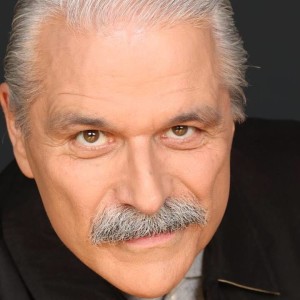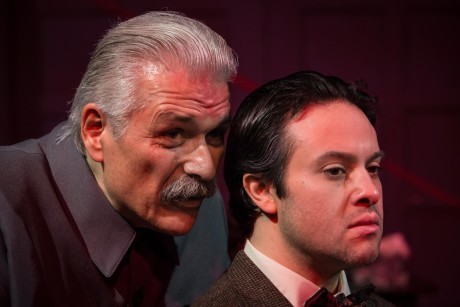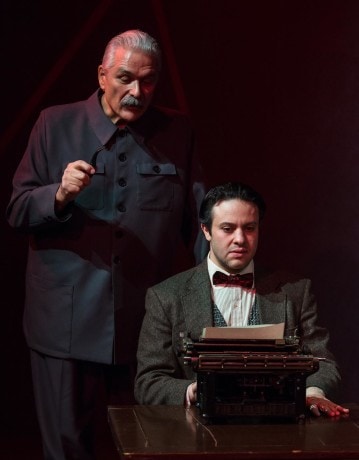In Part 2 of our series with the cast of Spooky Action’s Collaborators, meet Joe Duquette.
Joel: Please introduce yourself and tell our readers where they may have seen you perform on the stage?

Joe: I’m a proud Actors’ Equity member of over 35 years. I work in Washington, DC, New York, Los Angeles, and regionally. I did a staged-reading of a very beautiful play called Mrs. Palfrey at the Claremont at Arena Stage last Fall, have worked Off-Broadway, at the The Actors’ Studio NY, St. Louis MUNY, Goodspeed Opera House, Heritage Repertory Theatre, Ash Lawn Opera Company, Odyssey Theatre LA, and The Lawrence Welk Village Theatre, among others.
Why did you want to become a member of the cast of Collaborators?
Director Richard Henrich asked me to audition for what is described as a “bleak, honest satire” and upon receiving the script, fell in love with it and immediately delved into the vast amount of historical information about the main and supporting characters.
John Hodge’s writing is magnificent and my role is one of those tour de force roles where I get to use so much of my palette of emotions and acting styles, from slapstick to treacherous, from humorous and playful to manipulative, from likeable to ruthless – it’s all there.
Who do you play in the show and how do you relate to him?
I play Joseph Stalin, who was born a poor cobbler’s son from Gori, Georgia who became a Bolshevik revolutionary beside Lenin and Trotsky, to eventually become the leader of the entire USSR.
In his younger days, Stalin studied in a seminary and I was once in religious life so was able to get a sense of his early environment.
I relate to his humor and congeniality, but other than my abilities to portray them, not his aggressive, untruthfulness, and of course, not his systematic and uncompromising purges.
What is the play about from the point of view of your character?
For my character, the play is all about pure power over others, all the way up to killing his enemies, which is easy, as he attempts to control their minds
It’s man vs monster, and the monster always wins.
What do you admire about your character and what do you not admire about him?
The bulk of my character lives within the world of three discovered items, two photos and a quote, which gave me permission to experiment anywhere with my role.
The first photo shows him holding his fist close to his face with thumb stretched to his nose and pinky lifted in a nya-nay position showing his goofiness; the second photo is one of his many poses that would live on the side of the Metro wall or major building showing his superior strength.
The quote is a story told of a time when Stalin had lost his pipe and called the NKVD (secret police) to find it.
He later called and said he had found it in his boot and to forget about looking for the thief. They told him that they had already rounded up ten people. When Stalin said to let them go, the NKVD office said he didn’t think he could as all of them had already confessed. This quote illustrated his paranoia.
I can admire goofiness as it can be entertaining to a toddler and a tension reliever in certain adult situations. I can admire the strength and single-minded purposefulness of someone who rises from poverty to stand up against what they see as unfair, and to then acquire a level of ability to authentically lead a nation.
But, I cannot condone pretty much any of the actions I have read about thus far that Stalin has stood for in his life.

What did you learn about Bulgakov and Stalin after you were cast in the show that you didn’t know before you were cast?
Somehow I think Stalin is not nearly as well known as Hitler, certainly true for me, and I knew nothing about Bulgakov.
I wonder why that is since Stalin did so much more damage to his country as far as mass persecutions and killings, and caused the worst existing man-made famine.
Before rehearsals, I learned many of the details of both their lives and the lives of the folks with whom they interacted, details of the Great Purge of the 1930s as well as personal writings of Bulgakov and his wife.
I wanted to know about Stalin’s relationships so hunted down every image, still, and moving, I could find to see in these captured moments how he related to others, his family, friends, classmates, fellow revolutionaries, and Soviet leaders (and how he would re-engineer history by years later removing unwanted individuals from reissued photos).
What advice and suggestions did Richard Henrich give you that helped you prepare for your role? Have you ever worked with him before? What is his process?
I had not worked with Richard before – he is very easy going and allowed me to freely experiment with the grandness and subtlety of every character choice.
Especially when he saw how much research I was doing outside of the given circumstances of the play, a month before rehearsal, he did mention casually “Don’t channel Stalin – if you do, we’re all in trouble…”
He suggested that this is our Stalin and to suspend reality. Once in rehearsals, Richard mentioned I am two different Stalins – play the two different tones. I came in with the subtle to broad comedy, and Richard suggested I be methodical and dangerously crazy, clear, precise, deliberate, cold, quiet, by-the-numbers, bold – to break the wild horse who is Bulgakov, twist the knife of blame in his wound, blaming him for everything that is going wrong, which is the way Stalin actually acted historically.
He reminded Paul Reisman (Bulgakov) and I that we each have power, Stalin has malicious power and physical power to change circumstances, Bulgakov has the power of imagination (which Stalin desires).
“Relish the silence of my entrance” was another nice moment to discover, and of course, make sure the ribbon is seated in the typewriter…
What have been some of the challenges you have faced in preparing for your role?
Between the two at the drop of a hat, but unlike J&H, there are gradations between the two, when it is appropriate to serve the text. So, it was not until the rehearsal process where I was able to work with Paul that I could find those gradient moments.
I call this my “adjective play.” Because many of my quickly-paced lines are not constructed in a way that are normal speech patterns, that they contain very abstract and absurd thoughts, and that adjectives very often outnumber nouns, they were a bit more challenging to piece together.
What lines that someone else says are your favorites?
All of the members of this ensemble cast have great lines – here are some of them:
“My peasants loved me. I know you lefty liberals don’t like to hear that sort of thing but it’s true.”
“What an idiot I am! I hadn’t made any provision for you expressing your free will.”
“Apparently there’s quite a market for novels about counter-revolutionaries who see the light through the purifying effects of digging a canal.”
“You think I might find some empathy, some connection – with a loathsome psychopathic despot.”
“I may have overstepped the mark in threatening to shoot your wife. I feel bad about it.”
“These individuals – students engineers, politicians, rootless… whatever – on their own – harmless.”
“I have it all, Mikhail. All I have been waiting for is you.” “Everything you’ve witnessed so far, everything you’ve heard about, has just been a warm-up.”
What themes and issues does the play address that current audiences will be able to relate to?

When an oath is taken by one who testifies in court, they swear to tell the truth, the whole truth, and nothing but the truth.
There are world leaders, in the 21st century, who still want to aggressively invade sovereign nations, casually eliminate those who do not think as they do, and rise to political power in most countries by deceiving others through the use truth mangled, false truths, half-truths, and outright lies, if the market will bear.
What do you want audiences to take with them after watching Collaborators?
Besides being an entertaining experience, I hope that, throughout our play’s many comedic and dramatic moments, we can move the folks who see this play, especially those who have a voice and who have the ability to instigate good, constructive change, can remind the young and the old that we must not make the mistakes of our planet’s immoral leaders’ cumulative past.
Another audience member said it left his Russian wife in tears and he fully satisfied by the epic story of treachery…
To have audiences leave thinking and feeling – I guess that would be my answer.
Running Time: Two hours and 15 minutes, with one intermission.
Collaborators plays through March 13, 2016 at Spooky Action Theater performing at the Universalist National Memorial Church – 1810 16th Street, NW, in Washington, DC. For tickets, purchase them online.
LINKS:
‘Collaborators’ at Spooky Action Theater reviewed by David Siegel.
Meet The Cast of Spooky Action Theater’s ‘Collaborators’: Part 1: Paul Reisman by Joel Markowitz.
Meet The Cast of Spooky Action Theater’s ‘Collaborators’: Part 2: Joe Duquette by Joel Markowitz.
An Interview with ‘Collaborators’ Playwright John Hodge by Roberta Alves by Joel Markowitz.





